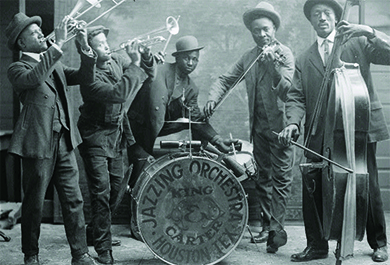| << Chapter < Page | Chapter >> Page > |

Could you go “on a toot” with flappers and sheiks? Improve your chances with this collection of Jazz Age slang.
New dances and new music—especially jazz—also characterized the Jazz Age. Born out of the African American community, jazz was a uniquely American music. The innovative sound emerged from a number of different communities and from a number of different musical traditions such as blues and ragtime. By the 1920s, jazz had spread from African American clubs in New Orleans and Chicago to reach greater popularity in New York and abroad. One New York jazz establishment, the Cotton Club, became particularly famous and attracted large audiences of hip, young, and white flappers and sheiks to see black entertainers play jazz ( [link] ).

The Jazz Age and the proliferation of the flapper lifestyle of the 1920s should not be seen merely as the product of postwar disillusionment and newfound prosperity. Rather, the search for new styles of dress and new forms of entertainment like jazz was part of a larger women’s rights movement. The early 1920s, especially with the ratification of the Nineteenth Amendment guaranteeing full voting rights to women, was a period that witnessed the expansion of women’s political power. The public flaunting of social and sexual norms by flappers represented an attempt to match gains in political equality with gains in the social sphere. Women were increasingly leaving the Victorian era norms of the previous generation behind, as they broadened the concept of women’s liberation to include new forms of social expression such as dance, fashion, women’s clubs, and forays into college and the professions.
Nor did the struggle for women’s rights through the promotion and passage of legislation cease in the 1920s. In 1921, Congress passed the Promotion of the Welfare and Hygiene of Maternity and Infancy Act, also known as the Sheppard-Towner Act, which earmarked $1.25 million for well-baby clinics and educational programs, as well as nursing. This funding dramatically reduced the rate of infant mortality. Two years later, in 1923, Alice Paul drafted and promoted an Equal Rights Amendment (ERA) that promised to end all sex discrimination by guaranteeing that “Men and women shall have equal rights throughout the United States and every place subject to its jurisdiction.”
Yet, ironically, at precisely the time when the Progressive movement was achieving its long-sought-after goals, the movement itself was losing steam and the Progressive Era was coming to a close. As the heat of Progressive politics grew less intense, voter participation from both sexes declined over the course of the 1920s. After the passage of the Nineteenth Amendment, many women believed that they had accomplished their goals and dropped out of the movement. As a result, the proposed ERA stalled (the ERA eventually passed Congress almost fifty years later in 1972, but then failed to win ratification by a sufficient number of states), and, by the end of the 1920s, Congress even allowed funding for the Sheppard-Towner Act to lapse.

Notification Switch
Would you like to follow the 'U.s. history' conversation and receive update notifications?